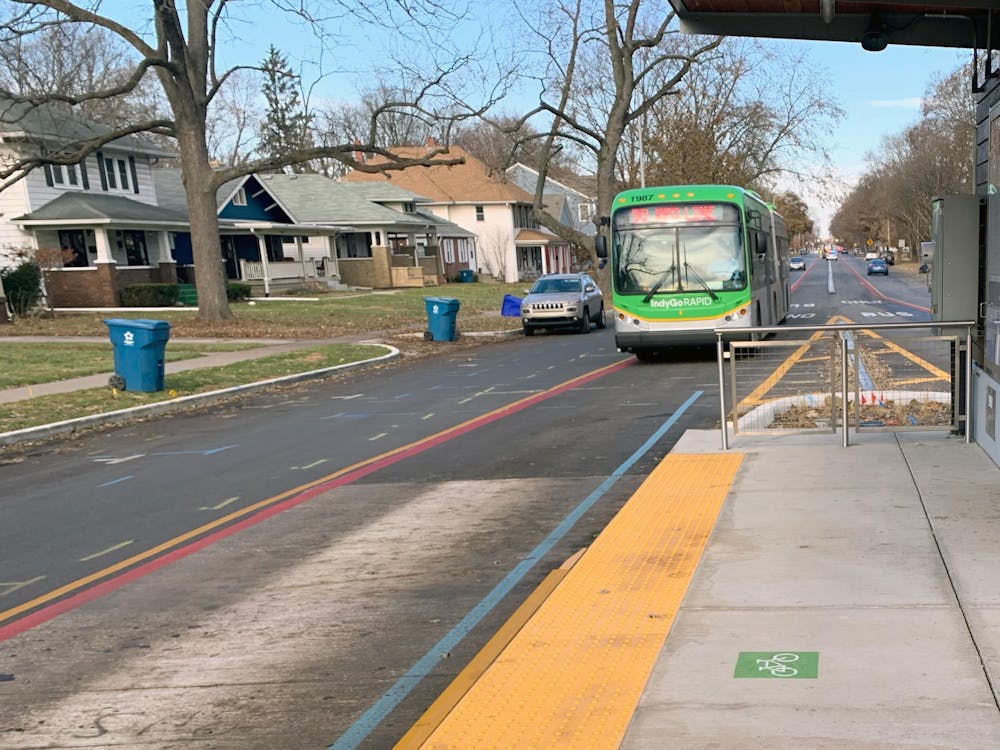By all measures, IndyGo, Indianapolis’ public transportation operator, is on the rise.
Ridership is up 8% year-over-year, IndyGo announced last week. The Red Line, the country’s first all-electric bus rapid transit line, opened in September, and planning on two more BRT lines is underway.
So it’s only fitting that the Indiana Senate wants to stop IndyGo’s momentum by cutting funding.
This isn’t funding allocated by the state, either. This is funding that nearly 60% of Marion County taxpayers said “yes” to when they voted in 2016 to support a 0.25% income tax increase for improving public transit.
State Sen. Aaron Freeman, R-Indianapolis, authored an amendment to H.B. 1279 — a bill that has nothing to do with Indianapolis — that would let the state take 10% of IndyGo’s income tax revenue unless it can pay for at least 10% of annual expenses with privately raised funds. The Senate passed the amendment Thursday.
Freeman argues that IndyGo should have seen this coming. Legislation passed in 2014 requires counties that raise income taxes for public transit to also set up nonprofits to raise private funds, with the goal of privately funding 10% of expenses. The new bill would penalize Marion County for not meeting the goal.
In fact, IndyGo did see this coming. The Indianapolis Public Transportation Foundation incorporated in 2018 and received nonprofit status last summer. The foundation is on its way to start raising funds to comply with the law.
But it shouldn’t have to.
We don’t require the Indiana Department of Transportation to set up a foundation to raise private funds to repair highways, so why do we expect IndyGo to?
The state isn’t allocating money to IndyGo that it would’ve otherwise spent on other projects because of the transit referendum. It is dedicated transit tax dollars that people in Indianapolis voted for.
By taking away money from IndyGo, Indianapolis City-County Councillor Ali Brown argues that the state would be disproportionately harming vulnerable Indianapolis residents.
“It’s an attack on people of color, it's an attack on low-income communities. It's an attack on our most vulnerable populations in the county,” Brown said. “The state needs to leave us alone and let us govern because we know what's better for Indianapolis.”
The Indiana General Assembly believes in limited government — until it doesn’t.
The state prohibits local governments from regulating guns or setting a local minimum wage. City governments can’t force landlords to accept public housing vouchers or ban plastic bags.
And now, state lawmakers want to cut funding for a service taxpayers want.
This couldn’t have come at a worse time for IndyGo.
Planners are working on a new grid-based route system to increase service. IndyGo is also finalizing routes for bus rapid transit lines to connect the airport to the east suburb of Cumberland and the northeast suburb of Lawrence to downtown.
“IndyGo has already made changes to the network to increase service and plans for future capital projects with a goal of a 70% increase in service,” IndyGo spokesperson Faith Chadwick said in a statement. “The amendment, as it’s written today, would jeopardize IndyGo’s ability to implement the plan voters supported, and the additional service IndyGo has already introduced.”
So what’s next for the amendment?
The bill has not passed out of the Indiana Senate yet. It will first need to pass the Senate before going back to the House for approval of the amendments.
“Call your senators, don't stop calling your senators. Send them an email,” Brown said. “Just keep calling them, telling them that Indianapolis knows what's best.”
Jacob deCastro (he/him) is a junior studying journalism. He wants to be able to take a train from IU to anywhere in the U.S.
CORRECTION: A previous version of this column misquoted Indianapolis City-County Councillor Ali Brown. Brown said H.B. 1279 would be an attack on vulnerable Indianapolis residents. The IDS regrets this error.






